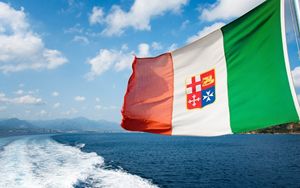(Finance) – In progress today and tomorrow in Trieste the first edition of Sea Resource Forumrealized by The European House – Ambrosetti in collaboration with the Ministry for Civil Protection and Maritime Policies and the patronage of the Presidency of the Council of Ministers. The initiative aims to become an event of annual comparison itineranttouching a new port city every year.
The Forum was born following the elaboration and approval, last July 31st, by the CIPOM (Interministerial Committee for Maritime Policies) met at Palazzo Chigi under the presidency of the minister Nello Musumeciof the National Sea Planthe tool of programming which the Government and Parliament have equipped themselves with to launch a unitary and strategic maritime policy.
The National Sea Plan considers 16 directions that they predict protection and enhancement of the Sea Resource from the point of view environmental, logistical, economic; the fields of action touch the sea resource with a systemic and interconnected approach, enhancing all areas, from the port system to fishing, from tourism to logistics; in short, it is a promotion of the national sea system at an international level, which integrates the valorisation of state maritime property.
The first edition of the Sea Forum organized by Ambrosetti therefore starts from the analysis of this plan and aims to follow it in its development.
“It could only be Trieste, for its history, for its evocative strength, for its geopolitical and maritime role, to host the government’s first meeting on strategies for the sea. For the first time, Italy has a planning tool, the Sea Plan, and we will illustrate it during the two days at the port. With the Meloni government, the sea, not only as a resource, returns to the center of the political agenda” he said Nello MusumeciMinister for Civil Protection and Maritime Policies.
“The Sea Plan is an excellent starting point for simplifying the governance of a very complex sector subject to strong international competition. Italy has what it takes to establish itself as a player of international importance in all areas, which can make an important contribution not only in terms of growth but also in achieving our country’s sustainability objectives. In particular, in the 16 guidelines of the Sea Plan, we have identified eight areas of strategic investment for the country system. In this sense, our initiative, complementary to the Sea Plan, aims to direct public and private investments linked to the sea in the most promising supply chains, promoting ever greater cohesion between operators in the sector and concretely stimulating collaboration between public and private ” he instead declared Valerio De MolliManaging Partner & CEO, The European House – Ambrosetti.
According to data processed by The European House – Ambrosetti on 2023 data from the European Commission, in 2019 the added value produced by the sea economy in the 27 countries of the European Union was equal to 184.9 billion euros (1.5% of the total EU-27 economy) and the busy are equal to 4.5 million (2.3% of the total employed in the EU-27).
Italy is the third largest country in the EU both for value addedwith a share of 24.5 billionboth for employed, with over 540 thousand places of work. An economic system that contributes approximately 65 billion to the GDP of the country, with a multiplier of 2.7 (1€ produced in the Sea Economy activates another 1.7 in the rest of the economy).
On this first day the topics covered were many, but they can be summarized in two fundamental points, according to the declarations of industrial stakeholders and political protagonists:
First point: fishing is a fundamental asset for the country, but it has been in sharp decline for years and European policies do not favor us. Environmental protection requires progressive abandonment of trawlingbut if this is simple for the northern countries, for Italy, which bases 30% of its fishing vessels on this typology, it is a enormous damage. The government has also reiterated its opposition to synthetic meat, even in the case of an application of this technology in the fishing sector.
Second Point: Italy’s central position in the Mediterranean it’s a huge opportunity for energy logistics; the current geopolitical situation requires supplies of natural gases from the South (Africa primarily), while before the war between Russia and Ukraine the main streams passed through the North. Italy can b the energy hub of reference for Europe, today thanks to natural gas, in a relatively near future thanks to massive production of hydrogen in the Sahara through photovoltaics. Again from an energy perspective, it is important to monitor the situation of the seabed and regulate their use in an effective and reasoned manner, not only in relation to fishing, but also from an off-shore perspective.
